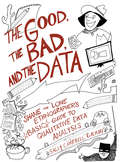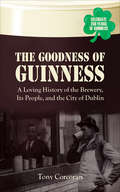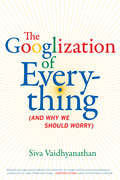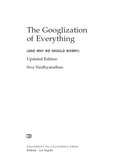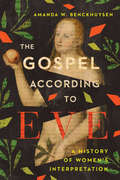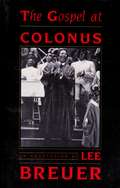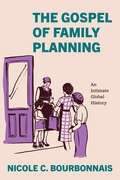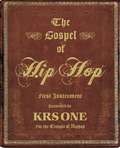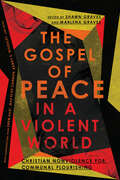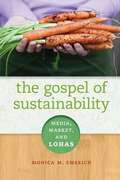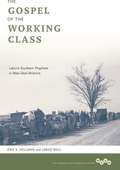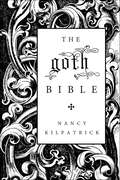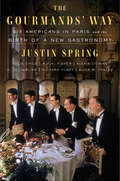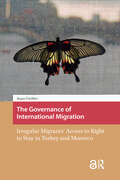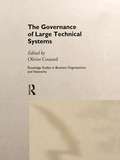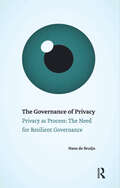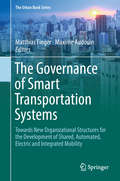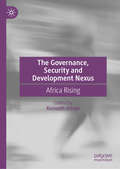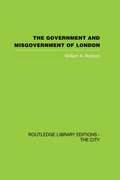- Table View
- List View
The Good, the Bad, and the Data: Shane the Lone Ethnographer’s Basic Guide to Qualitative Data Analysis
by Sally Campbell PirieData analysis is often the most difficult task facing students and novice qualitative researchers, including Shane the Lone Ethnographer—a grad student with fond visions of the Wild West—and her horse Transcriptor. In this comic-style textbook, we follow Shane as she attempts to corral her data and make sense of it for publication. Shane learns how to read, sort, code, write, and assess the analysis of a qualitative study in the traditions of ethnography, grounded theory, discourse, and narrative analysis. Along the trail, she receives helpful advice from experienced researchers who explain their analytic practices in detail. Written in a friendly, comic book style, Shane’s Wild West adventures in data analysis will be both instructive and an enjoyable read.
The Good-Enough Life
by Avram AlpertHow an acceptance of our limitations can lead to a more fulfilling life and a more harmonious societyWe live in a world oriented toward greatness, one in which we feel compelled to be among the wealthiest, most powerful, and most famous. This book explains why no one truly benefits from this competitive social order, and reveals how another way of life is possible—a good-enough life for all.Avram Alpert shows how our obsession with greatness results in stress and anxiety, damage to our relationships, widespread political and economic inequality, and destruction of the natural world. He describes how to move beyond greatness to create a society in which everyone flourishes. By competing less with each other, each of us can find renewed meaning and purpose, have our material and emotional needs met, and begin to lead more leisurely lives. Alpert makes no false utopian promises, however. Life can never be more than good enough because there will always be accidents and tragedies beyond our control, which is why we must stop dividing the world into winners and losers and ensure that there is a fair share of decency and sufficiency to go around.Visionary and provocative, The Good-Enough Life demonstrates how we can work together to cultivate a good-enough life for all instead of tearing ourselves apart in a race to the top of the social pyramid.
The Goodness of Guinness: A Loving History of the Brewery, Its People, and the City of Dublin
by Tony CorcoranThere is no other company, industry, or premises more closely aligned--indeed almost synonymous--with its hometown than Guinness's St. James's Gate Brewery and the city of Dublin. From the company's modest beginnings in 1759 to its heyday in the late nineteenth and early twentieth centuries and its continued strength into the twenty-first century, Guinness has had an enormous influence over the city's economic, social, and cultural life. In this warm and fascinating piece of history, Tony Corcoran examines the magnitude of the brewery's operation, and the working lives of the thousands of Dubliners who have depended on Guinness for their livelihood, either directly or indirectly. The company's unusually progressive treatment of its workers--health care, training, and housing--is revealed in detail, as is the Guinness family's philanthropy and compassion towards the less well-off residents of the city. Tracing Guinness's progressive attitudes to their roots, Corcoran also explores the important roles of the strong-willed women in each generation of the Guinness dynasty. A labor of love, full of anecdotes, humor, and historical insights into one of Dublin's most important and best-loved institutions. "Whenever I bleed, I am always surprised to see that my blood is not black. Certainly, when you consider that I was born into two Guinness families, had two Guinness grandfathers and five Guinness uncles, and was on the premises of Guinness before I could walk, I am as much a product of Guinness as the black stuff itself."--Tony Corcoran
The Googlization of Everything
by Siva VaidhyanathanIn the beginning, the World Wide Web was exciting and open to the point of anarchy, a vast and intimidating repository of unindexed confusion. Into this creative chaos came Google with its dazzling mission--"To organize the world's information and make it universally accessible"--and its much-quoted motto, "Don't be evil." In this provocative book, Siva Vaidhyanathan examines the ways we have used and embraced Google--and the growing resistance to its expansion across the globe. He exposes the dark side of our Google fantasies, raising red flags about issues of intellectual property and the much-touted Google Book Search. He assesses Google's global impact, particularly in China, and explains the insidious effect of Googlization on the way we think. Finally, Vaidhyanathan proposes the construction of an Internet ecosystem designed to benefit the whole world and keep one brilliant and powerful company from falling into the "evil" it pledged to avoid.
The Googlization of Everything: And Why We Should Worry
by Siva VaidhyanathanIn the beginning, the World Wide Web was exciting and open to the point of anarchy, a vast and intimidating repository of unindexed confusion. Into this creative chaos came Google with its dazzling mission--"To organize the world's information and make it universally accessible"--and its much-quoted motto, "Don't be evil." In this provocative book, Siva Vaidhyanathan examines the ways we have used and embraced Google--and the growing resistance to its expansion across the globe. He exposes the dark side of our Google fantasies, raising red flags about issues of intellectual property and the much-touted Google Book Search. He assesses Google's global impact, particularly in China, and explains the insidious effect of Googlization on the way we think. Finally, Vaidhyanathan proposes the construction of an Internet ecosystem designed to benefit the whole world and keep one brilliant and powerful company from falling into the "evil" it pledged to avoid.
The Gospel According to Eve: A History of Women's Interpretation
by Amanda W. BenckhuysenWhat does it mean to be male and female? Do women and men have different intellectual, spiritual, moral, or emotional capacities? Are women especially suited for serving and men for leading? Are women and men equal? While these may seem like relatively recent questions, they have been a topic of conversation throughout Christian history. At the center of this conversation is the biblical character Eve, the archetypal woman of Genesis 1-3. Not simply one woman among many, Eve comes to represent all women, defining the very essence of what it is to be female. As Eve was a woman, so all women were Eve, the conditions of her creation and her involvement in the Fall often serving as a justification for limitations placed on women and for their subordination to men. Over the centuries, women themselves have read and interpreted the story of Eve, scrutinizing the details of the text to discern God's word for them. Often their investigations led them to insights and interpretations that differed from dominant views, shaped as they were by men. The Gospel According to Eve traces the history of women's interpretation of Genesis 1-3, readings of Scripture that affirmed women's full humanity and equal worth. Biblical scholar Amanda Benckhuysen allows the voices of women from the past to speak of Eve's story and its implications for marriage, motherhood, preaching, ministry, education, work, voting, and more.
The Gospel Of Gentility: American Women Missionaries In Turn-of-the Century-China
by Jane HunterAt the turn of the century, women represented over half of the American foreign mission force and had settled in "heathen" China to preach the lessons of Christian domesticity. In this engrossing narrative, Jane Hunter uses diaries, reminiscences, and letters to recreate the backgrounds of the missionaries and the problems and satisfactions they found in China. Her book offers insights not only into the experiences of these women but also into the ways they mirrored the female culture of Victorian America.
The Gospel at Colonus
by Lee BreuerA founding member of the acclaimed New York-based company Mabou Mines, Breuer's gifts as a writer and director have have made him a mainstay of the theatrical avant-garde.
The Gospel of Family Planning: An Intimate Global History
by Nicole C. BourbonnaisAn engaging, insightful history of the family planning movement and its connection to broader social and political developments across the globe. In the twentieth century, the idea that people should consciously plan (and limit) the size of their families became a global cause. Historical accounts of the global family planning movement have largely focused on the most prominent activists and those at the helm of international organizations, philanthropic foundations, and government programs. In The Gospel of Family Planning, however, historian Nicole C. Bourbonnais shifts our attention to frontline workers—doctors, social workers, nurses, fieldworkers, consultants, church groups, and volunteers—who, she compellingly shows, played a central (if complicated) role in preaching contraception around the world. Through a mix of collective biography and microhistory, Bourbonnais visits clinics, doorsteps, and bedrooms, revealing the everyday, ground-level workings of grassroots family planning campaigns, state population control programs, and the movements for reproductive rights and justice that arose to contest them. Throughout the book, Bourbonnais invites readers to consider how the intertwined histories of missionary work, humanitarianism, feminism, decolonization, and international development shaped intimate interventions into people’s reproductive lives around the world.
The Gospel of Hip Hop: The First Instrument
by Krs OneThe Gospel of Hip Hop: First Instrument, the first book from theI Am Hip Hop, is the philosophical masterwork of KRS ONE. Set in the format of the Christian Bible, this 800-plus-page opus is a life-guide manual for members of Hip Hop Kulture that combines classic philosophy with faith and practical knowledge for a fascinating, in-depth exploration of Hip Hop as a life path. Known as “The Teacha,” KRS ONE developed his unique outlook as a homeless teen in Brooklyn, New York, engaging his philosophy of self-creation to become one of the most respected emcees in Hip Hop history. Respected as Hip Hop’s true steward, KRS ONE painstakingly details the development of the culture and the ways in which we, as “Hiphoppas,” can and should preserve its future. "The Teacha" also discusses the origination of Hip Hop Kulture and relays specific instances in history wherein one can discover the same spirit and ideas that are at the core of Hip Hop’s current manifestation. He explains Hip Hop down to the actual meaning and linguistic history of the words “hip” and “hop,” and describes the ways in which "Hiphoppas" can change their current circumstances to create a future that incorporates Health, Love, Awareness, and Wealth (H-LAW). Committed to fervently promoting self-reliance, dedicated study, peace, unity, and truth, The "Teacha" has drawn both criticism and worship from within and from outside of Hip Hop Kulture. In this beautifully written, inspiring book, KRS ONE shines the light of truth, from his own empirical research over a 14-year period, into the fascinating world of Hip Hop.
The Gospel of Peace in a Violent World: Christian Nonviolence for Communal Flourishing
by Marlena Graves Marlena Graves, Shawn Graves Shawn Graves"Blessed are the peacemakers."The gospel of Jesus Christ is the good news of peace: peace between God and humanity, peace among humans. And yet it can be difficult to see that peace in our broken, violent world.shalomMay it be so.
The Gospel of Sustainability: Media, Market and LOHAS
by Monica M. EmerichFrom organic produce and clothing to socially conscious investing and eco-tourism, the lifestyles of health and sustainability, or LOHAS, movement encompasses diverse products and practices intended to contribute to a more sustainable lifestyle for people and the planet. In The Gospel of Sustainability, Monica M. Emerich explores the contemporary spiritual expression of this green cultural shift at the confluence of the media and the market. This is the first book to qualitatively study the LOHAS marketplace and the development of a discourse of sustainability of the self and the social and natural worlds. Emerich draws on myriad sources related to the notions of mindful consumption found throughout the LOHAS marketplace, including not just products and services but marketing materials, events, lectures, regulatory policies, and conversations with leaders and consumers. These disparate texts, she argues, universally project a spiritual message about personal and planetary health that is in turn reforming capitalism by making consumers more conscious.
The Gospel of Wellness: Gyms, Gurus, Goop and the False Promise of Self-Care
by Rina RaphaelHow did a modest industry of diets and calisthenics evolve into this mammoth business of luxe self-care?In this fun-filled dive into the wellness industry, journalist Rina Raphael looks at the roots of a sector that is now worth $4.5 trillion dollars and explores why it's been so alluring to women all over the globe, promising health and vitality in the most fashionable package.At times both fun and funny, from interviews with leading players in the industry to adventures in more bizarre practices such as desert dancing while drinking your own urine, The Gospel of Wellness reveals how its growth is a direct result of gender inequalities and structural sexism within medicine and society, forcing women to lookelsewhere for health solutions. In theory a huge force for good, women are now looded with offerings from more exploitative areas of the industry, peddling snake oil and questionable ideas for a pretty price.For anyone who values their exercise but has raised an eyebrow at the use of a certain jade egg, The Gospel of Wellness balances the bad with the good and offers a cool and steady look at a powerful player in today's society.
The Gospel of Wellness: Gyms, Gurus, Goop, and the False Promise of Self-Care
by Rina Raphael“Next-level revelatory."—Sarah Knight, New York Times bestselling author of The Life-Changing Magic of Not Giving a F*ck“Excellent...Rina really knows her shit...I'm so thankful for this book.”—Jameela Jamil, actress and host of I WeighJournalist Rina Raphael looks at the explosion of the wellness industry: how it stems from legitimate complaints, how seductive marketing targets hopeful consumers–and why women are opening up their wallets like never before.Wellness promises women the one thing they desperately desire: control.Women are pursuing their health like never before. Whether it’s juicing, biohacking, clutching crystals, or sipping collagen, today there is something for everyone, as the wellness industry has grown from modest roots into a $4.4 trillion entity and a full-blown movement promising health and vitality in the most fashionable package. But why suddenly are we all feeling so unwell?The truth is that deep within the underbelly of self-care—hidden beneath layers of clever marketing—wellness beckons with a far stronger, more seductive message than health alone. It promises women the one thing they desperately desire: control.Vividly told and deeply reported, The Gospel of Wellness reveals how this obsession is a direct result of women feeling dismissed, mistreated, and overburdened. Women are told they can manage the chaos ruling their life by following a laid-out plan: eat right, exercise, meditate, then buy or do all this stuff. And while wellness may have sprung from good intentions, we are now relentlessly flooded with exploitative offerings, questionable ideas, and a mounting pressure to stay devoted to the divine doctrine of wellness. What happens when the cure becomes as bad as the disease?With a critical eye, humor, and empathy, wellness industry journalist Rina Raphael examines how women have been led down a kale-covered path promising nothing short of salvation. She knows: Raphael was once a disciple herself—trying everything from “clean eating” to electric shock workouts—until her own awakening to the troubling consequences. Balancing the good with the bad, The Gospel of Wellness is a clear-eyed exploration of what wellness can actually offer us, knocking down the false idols and commandments that have taken hold and ultimately showing how we might shape a better future for the movement—and for our well-being.
The Gospel of the Working Class: Labor's Southern Prophets in New Deal America
by Erik S. Gellman Jarod RollIn this exceptional dual biography and cultural history, Erik S. Gellman and Jarod Roll trace the influence of two southern activist preachers, one black and one white, who used their ministry to organize the working class in the 1930s and 1940s across lines of gender, race, and geography. Owen Whitfield and Claude Williams, along with their wives Zella Whitfield and Joyce Williams, drew on their bedrock religious beliefs to stir ordinary men and women to demand social and economic justice in the eras of the Great Depression, New Deal, and Second World War. Williams and Whitfield preached a working-class gospel rooted in the American creed that hard, productive work entitled people to a decent standard of living. Gellman and Roll detail how the two preachers galvanized thousands of farm and industrial workers for the Southern Tenant Farmers Union and the Congress of Industrial Organizations. They also link the activism of the 1930s and 1940s to that of the 1960s and emphasize the central role of the ministers' wives, with whom they established the People's Institute for Applied Religion. This detailed narrative illuminates a cast of characters who became the two couples' closest allies in coordinating a complex network of activists that transcended Jim Crow racial divisions, blurring conventional categories and boundaries to help black and white workers make better lives. In chronicling the shifting contexts of the actions of Whitfield and Williams, The Gospel of the Working Class situates Christian theology within the struggles of some of America's most downtrodden workers, transforming the dominant narratives of the era and offering a fresh view of the promise and instability of religion and civil rights unionism.
The Goth Bible
by Nancy KilpatrickWhat you don't know about goths could fill a book!An artistic culture that revels in the Victorian romantic movement, The goth Bible brings to light the traditions and history of all that is goth. The goth culture has been one of the most controversial and maligned in media history. Presented as homicidal, suicidal and socio-pathic, in the national consciousness goths are coupled with everyone from Marilyn Mason to the murderers of Columbine. But this is not who the goths are. The goth Bible will help bridge the understanding between goths and non-goths. From their historical origins as a Germanic tribe in the sixth century who fought along side the Romans against the Huns to their current incarnation as creatures of the night, The goth Bible presents the most complete and broad perspective of this society, culled from hundreds of interviews with bands, artist, designers, and goths from all walks of life.
The Gothic in Contemporary Literature and Popular Culture: Pop Goth (Routledge Interdisciplinary Perspectives on Literature)
by Justin D. Edwards Agnieszka Soltysik MonnetThis interdisciplinary collection brings together world leaders in Gothic Studies, offering dynamic new readings on popular Gothic cultural productions from the last decade. Topics covered include, but are not limited to: contemporary High Street Goth/ic fashion, Gothic performance and art festivals, Gothic popular fiction from Twilight to Shadow of the Wind, Goth/ic popular music, Goth/ic on TV and film, new trends like Steampunk, well-known icons Batman and Lady Gaga, and theorizations of popular Gothic monsters (from zombies and vampires to werewolves and ghosts) in an age of terror/ism.
The Gourmands' Way: Six Americans in Paris and the Birth of a New Gastronomy
by Justin SpringA biography of six writers on food and wine whose lives and careers intersected in mid-twentieth-century France During les trente glorieuses—a thirty-year boom period in France between the end of World War II and the 1974 oil crisis—Paris was not only the world’s most delicious, stylish, and exciting tourist destination; it was also the world capital of gastronomic genius and innovation. The Gourmands’ Way explores the lives and writings of six Americans who chronicled the food and wine of “the glorious thirty,” paying particular attention to their individual struggles as writers, to their life circumstances, and, ultimately, to their particular genius at sharing awareness of French food with mainstream American readers. In doing so, this group biography also tells the story of an era when America adored all things French. The group is comprised of the war correspondent A. J. Liebling; Alice B. Toklas, Gertrude Stein’s life partner, who reinvented herself at seventy as a cookbook author; M.F.K. Fisher, a sensualist and fabulist storyteller; Julia Child, a television celebrity and cookbook author; Alexis Lichine, an ambitious wine merchant; and Richard Olney, a reclusive artist who reluctantly evolved into a brilliant writer on French food and wine.Together, these writer-adventurers initiated an American cultural dialogue on food that has continued to this day. Justin Spring’s The Gourmands’ Way is the first book ever to look at them as a group and to specifically chronicle their Paris experiences.
The Governance of Female Drug Users: Women's Experiences of Drug Policy
by Natasha Du RoseAvailable Open Access under CC-BY-NC licence. This book is the first to examine how female drug user's identities, and hence their experiences, are shaped by drug policies. It analyses how the subjectivities ascribed to women users within drug policy sustain them in their problematic use and reinforce their social exclusion. Challenging popular misconceptions of female users, the book calls for the formulation of drug policies to be based on gender equity and social justice. It will appeal to academics in the social sciences, practitioners and policy makers.
The Governance of International Migration: Irregular Migrants' Access to Right to Stay in Turkey and Morocco
by Aysen E. Üstübici ÖnayAs concern about immigration has grown within Europe in recent years, the European Union has brought pressure to bear on countries that are allegedly not sufficiently governing irregular migration with and within their borders. This book looks at that issue in Turkey and Morocco, showing how it affects migrants in these territories, and how migrant illegality has been produced by law, practiced and negotiated by the state, other civil society actors, and by migrants themselves. Aysen Üstübici focuses on a number of different aspects of migrant illegality, such as experiences of deportation, participation in economic life, and access to health care and education, in order to reveal migrants' strategies and the various ways they seek to legitimise their stay.
The Governance of Large Technical Systems (Routledge Studies in Business Organizations and Networks #No.13)
by Olivier CoutardThis work examines the governance of large technical systems (LTS) at firm, imdustry and state levels and the interactions between the systems and society. In particular, international contributors explore the implications of major technological , economic and social changes during the last twenty years for traditional forms of LTS governance. Their research is centred around the following themes:* traditional forms of governance* new regulatory challenges* the governability of complex technologies* conceptual issues related to the governance of inter-organizational networks
The Governance of Privacy: Privacy as Process: The Need for Resilient Governance
by Hans BruijnWe can hardly underestimate the importance of privacy in our data-driven world. Privacy breaches are not just about disclosing information. Personal data is used to profile and manipulate us - sometimes on such a large scale that it affects society as a whole. What can governments do to protect our privacy? In The Governance of Privacy Hans de Bruijn first analyses the complexity of the governance challenge, using the metaphor of a journey. At the start, users have strong incentives to share data. Harvested data continue the journey that might lead to a privacy breach, but not necessarily - it can also lead to highly valued services. That is why both preparedness at the start of the journey and resilience during the journey are crucial to privacy protection. The book then explores three strategies to deal with governments, the market, and society. Governments can use the power of the law; they can exploit the power of the market by stimulating companies to compete on privacy; and they can empower society, strengthening its resilience in a data-driven world.
The Governance of Smart Transportation Systems: Towards New Organizational Structures for the Development of Shared, Automated, Electric and Integrated Mobility (The Urban Book Series)
by Matthias Finger Maxime AudouinThis book presents essential new governance structures to embrace and regulate smart mobility modes. Drawing on a range of case studies, it paves the way for new approaches to governing future transportation systems. Over the past decades, Information and Communication Technologies have enabled the development of new mobility solutions that have completely redefined traditional and well-established urban transportation systems. Urban transportation systems are evolving dramatically, from the development of shared mobility modes, to the advent of electric mobility, and from the automated mobility trend to the rapid spread of integrated transportation schemes. Given the disruptive nature of those new mobility solutions, new governance structures are needed. Through a series of case studies from around the world, this book highlights governance and regulatory processes having supported, or sometimes prevented, the development and implementation of smart mobility solutions (shared, automated, electric, integrated). The combination of chapters offers a comprehensive overview of the different research endeavours focusing on the governance of smart transportation systems and will help pave the way for this important subject, which is crucial for the future of cities.
The Governance, Security and Development Nexus: Africa Rising
by Kenneth OmejeThis edited book analyses the changing links between governance, security and development in Africa as they relate to the narrative that contemporary Africa has made remarkable progress in recent years, a phenomenon popularly known as “Africa rising.” The book presents a rigorous evaluation of the Africa rising debate and consequently offers innovative policy guidelines for Africa’s governance and development transformation.
The Government and Misgovernment of London
by William A. RobsonThis book was first published in 1939.
